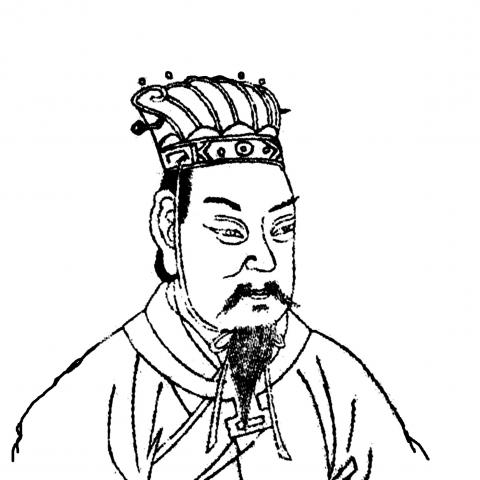Chinese Practice
說曹操曹操到
(shuo1 cao2 cao1 cao2 cao1 dao4)

Photo: Wikimedia Commons
照片:維基共享資源
say his name, and Cao Cao will appear
片語「speak of the devil」,或者其較符合歷史的說法「talk of the devil」,實際上是用來警告別發生所說到的事。這是一句古諺語「talk of the devil and he doth appear」(說到魔鬼它就出現了)的前半部,而你並非真的希望魔鬼出現。跟許多諺語一樣,我們通常只說出前半段,後半段的意思就如同歇後語一樣是用暗示的。
現今這句話的用法較輕鬆詼諧,是說若提到某人或某事,他(它)就會忽然出現,但其實它原本的意義並非輕鬆詼諧的。這個不准提到魔鬼的禁忌,也造成了各式各樣其他代稱,例如「黑暗王子」、「老尼克」,或「那個長角的」。
此句以現代英語首次見諸印刷文字,是在喬凡尼‧托利安諾所著之《世界廣場》
(西元一六六六年出版),書中提到,「英人常言,說到魔鬼,魔鬼就會在你手肘邊出現。」
中文俗語「說曹操曹操到」,形容才剛說到某人,某人就出現了。此語之典故咸認出自《三國演義》中的故事。《三國演義》第十四回描述漢獻帝在與叛軍交戰時陷入被圍困的險境,有大臣向漢獻帝推薦請曹操前來救駕。但尚未傳訊給曹操,曹操便已派兵前來解救皇上,最後順利脫困。三國演義將曹操描繪成一代奸雄、工於算計,因而處處佈下眼線,任何動靜都逃不過曹操耳目,所以曹操可能隨時在關鍵時刻出現。
但是「說曹操曹操到」一句並非出自《三國演義》,而是出自晚清曾樸所著譴責小說《孽海花》第二十九回其中一句對話:「無巧不成書!說到曹操,曹操就到。」
(台北時報編譯林俐凱譯)
說曹操曹操到,兒子啊,你看看誰來我們家了?
(Speak his name, and Cao Cao will appear. Look who’s come to visit us.)
我們還正猜想你今天到底會不會來練球呢!說曹操曹操到,你可出現了!
(We were just wondering whether you would come today to practice, and then you turn up.)
英文練習
speak/ talk of the devil
[and the devil doth come]
The phrase “speak of the devil” or, more historically, “talk of the devil,” is actually an admonishment to do just the opposite. It is the first half of an old proverb whose original form was “talk of the devil and he doth appear,” and you really don’t want the devil to appear. As is the case with many proverbs, it is customary to just say the first half, the rest of the phrase being implied.
Nowadays, it is more likely to be used in a lighthearted manner, commenting on the sudden appearance of a person or thing when their name is mentioned. It was not originally used in this lighthearted way, however. The taboo of mentioning the name of the devil probably contributed to the wealth of alternative ways in which to refer to him, such as the “Prince of Darkness,” “Old Nick,” or “the Horned One.”
The first known printed use of the phrase in modern English is in Giovanni Torriano’s Piazza Universale (1666), which tells us, “The English say, Talk of the Devil, and he’s presently at your elbow.”
In Chinese, there is the phrase “speak his name, and Cao Cao will appear,” describing the idea that if you say someone’s name, that person will materialize. The origin of the phrase is acknowledged as being from a story in the Romance of the Three Kingdoms. The 14th chapter of the book relates how Emperor Xian of Han found himself surrounded during a battle with the rebel army, and one of his ministers advised that he call for the warlord Cao Cao to come to his aid. It turns out that Cao Cao had already dispatched a force to save the emperor, even without word having been sent, and in the end Emperor Xian was able to escape. The book portrays Cao Cao as an ambitious schemer, who had eyes everywhere: nothing could escape his notice. It was for this reason that he was able to appear anywhere his presence was needed, and just in the nick of time.
The actual phrase was not found in the Romance, however: it comes from the “novel of denunciation” Flower in a Sea of Sin written in the late Qing by Zeng Pu. In Chapter 29 there appears the phrase, 「無巧不成書!說到曹操,曹操就到」, meaning “What a curious coincidence. Speak his name, and Cao Cao appears.”
(Paul Cooper, Taipei Times)
Where did you just come from? We were just talking about you. Speak of the devil...
(你是從哪裡冒出來的?我們才剛說到你。說曹操曹操到。)
Let’s not talk about Mr Jones here, he might walk by. You know what it’s like: talk of the devil...
(我們還是不要在這兒討論鍾斯先生的事,搞不好他會從這裡經過。你知道不該發生的巧合反而最有可能發生。)

A: The 2025 World Masters Games will begin on May 17 and run until May 30. B: World Masters Games? A: It’s a quadrennial multi-sport event for people over 30, which will be jointly held by Taipei and New Taipei City. B: Cool, maybe we can go cheer for all the athletes from home and abroad. A: There will be an athletes’ parade in downtown Taipei prior to the opening ceremony on Saturday. Let’s go then. A: 2025雙北世界壯年運動會5月17日開幕,持續至5月30日閉幕。 B: 世壯運? A: 這是四年一度、以30歲以上青壯年為主的運動會,本屆是由台北市和新北市共同舉辦。 B: 好酷喔,我們去幫來自國內外的選手們加油吧! A: 週六在台北市區會有選手遊行,之後是開幕典禮,我們去看吧。 (By Eddy Chang, Taipei Times/台北時報張迪)

A: Where will the 35 sports of the 2025 World Masters Games be held? B: Apart from Taipei and New Taipei City, some games will take place in Yilan County, Taoyuan County, and Hsinchu County and City. A: The news says about 25,000 people, including many celebrities and sports stars, have already registered for the games. B: Even Taipei Mayor Chiang Wan-an, who is 47, registered for softball and squash. New Taipei Mayor Hou You-yi, who is 68, also registered for table tennis. A: And it will be the largest sports event ever in Taiwan’s history. How exciting. A:

Computex, Asia’s biggest electronics conference, kicked off Monday in Taipei, and as in years past drew industry chieftains from Nvidia Corp.’s Jensen Huang and Qualcomm Inc.’s Cristiano Amon to Young Liu of Foxconn, which makes the bulk of the world’s iPhones and Nvidia servers. But while last year’s event was a celebration of the post-ChatGPT AI boom, executives this time are likely grappling with the uncertainty of the Trump administration’s effort to reshape the global trade order — disrupting a decades-old model for tech manufacturing. This year’s exhibition will of course feature the hardware required to bring artificial intelligence to life.

Have you ever wondered who decides what we see in a museum or how one artwork seamlessly connects to the next? Behind every thoughtfully arranged gallery space stands a curator, a skilled professional who combines art and storytelling to craft meaningful experiences. The term “curator” originates from the Latin word cura, meaning “to care.” Curators were originally caretakers of museum collections, but over time, their role has grown to include a broad range of responsibilities that extend far beyond preservation. Today, curators manage, organize and interpret collections in cultural institutions like museums and libraries. They research, acquire and catalogue